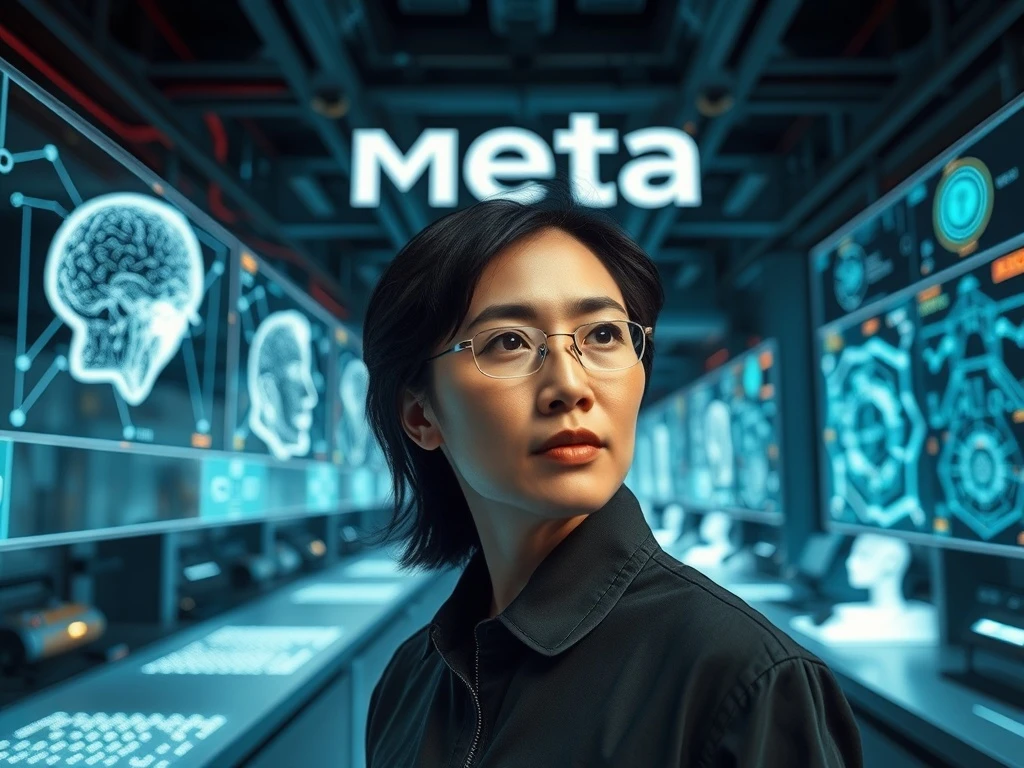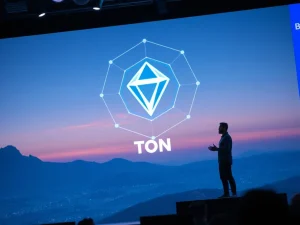Meta’s Bold AI Move: ChatGPT Co-Creator Shengjia Zhao to Spearhead ASI Lab

In the rapidly evolving landscape of artificial intelligence, the battle for supremacy is intensifying. Tech giants are not just competing for market share; they’re vying for the brightest minds that can unlock the next frontier of innovation. This high-stakes “AI Talent War” has reached a new crescendo with Meta’s latest strategic move, signaling a profound shift in the race for artificial superintelligence (ASI).
Shengjia Zhao Joins Meta: A Game-Changer for Meta AI?
Meta Platforms Inc. has made a groundbreaking announcement, appointing Shengjia Zhao, a distinguished co-creator of OpenAI’s ChatGPT, as the Chief Scientist of its newly established Meta Superintelligence Labs. This move, unveiled by CEO Mark Zuckerberg on July 25, 2025, underscores Meta’s aggressive strategy to assert dominance in the burgeoning field of artificial superintelligence. Zuckerberg hailed Zhao as a “leader in the field,” emphasizing his critical expertise in foundational AI architectures and synthetic data, which are set to drive the lab’s mission and accelerate Meta’s ASI roadmap.
Zhao’s appointment is part of a broader recruitment drive, including the earlier hire of former Scale AI CEO Alexandr Wang, now Meta’s chief AI officer. This series of high-profile acquisitions highlights Meta’s determination to challenge formidable rivals like OpenAI and Google. Zhao’s transition from OpenAI to Meta is particularly noteworthy, given his instrumental role in the development of ChatGPT. He brings invaluable experience in large language models (LLMs) and scaling paradigms, areas where Meta has historically faced criticism for lagging.
As a co-founder of the Superintelligence Lab, Zhao is positioned to lead core research while integrating product development. His mandate includes advancing open-source models like Llama, alongside proprietary advancements, aiming for a synergistic approach to innovation.
The Dawn of Meta’s ASI Lab: What Does This Mean for AI Development?
Established in June 2025, Meta Superintelligence Labs (ASI Lab) represents a consolidation of Meta’s ambitious AI initiatives under a single, focused umbrella. This centralization signals a strategic shift towards streamlined innovation, especially following recent challenges such as the lukewarm industry reception of the Llama 4 “Behemoth” model. The ASI Lab is designed to be the epicenter of Meta’s quest for artificial superintelligence, a level of AI far exceeding human cognitive abilities.
The vision for the ASI Lab extends beyond mere incremental improvements. It aims for breakthroughs that could redefine how AI interacts with the world, impacting everything from data processing to complex problem-solving. By bringing a figure of Zhao’s caliber to lead this endeavor, Meta is clearly signaling its intent to not just participate in, but to lead the next generation of AI innovation.
The Fierce AI Talent War: How Meta is Reshaping the Landscape
The hiring of Shengjia Zhao has ignited further debate surrounding Meta’s aggressive recruitment tactics in the ongoing “AI Talent War.” Reports have circulated about Meta offering compensation packages rumored to reach up to $100 million to attract top OpenAI employees. While Meta spokesperson Andy Stone has denied these specific figures as “untrue” and “misrepresented,” the company has confirmed substantial salary ranges: $850,000 for senior engineers and $1.54 million for E7-level staff. The reported bonuses and equity grants accompanying these salaries have certainly intensified scrutiny across the industry.
An anonymous senior OpenAI researcher acknowledged the “substantial” nature of Meta’s offers but noted that many colleagues at OpenAI prioritize project influence and the mission-driven culture over purely financial incentives. Similarly, Anthropic co-founder Benjamin Mann highlighted that his team’s strong, mission-focused culture has been key to retaining talent, drawing a contrast with companies that might be losing staff to “big paydays.” This dynamic illustrates the complex interplay of compensation, mission, and professional fulfillment in attracting and retaining elite AI professionals.
Beyond ChatGPT: Meta’s Vision for Advanced AI
While Zhao’s past success with ChatGPT is significant, Meta’s vision extends far beyond current large language models. Mark Zuckerberg’s strategy encompasses massive investments not only in top-tier personnel but also in foundational infrastructure. The company has committed $14 billion to Scale AI and pledged hundreds of billions more for ASI infrastructure. This includes innovative designs like “tent-style” data centers and energy-efficient “titan clusters,” specifically engineered to power high-compute tasks essential for advanced AI development.
A prime example of this infrastructural push is the planned Ohio facility, codenamed “Prometheus,” slated for operationalization by 2026. This focus on scaling computational resources aligns with broader industry trends that recognize hardware and data infrastructure as critical differentiators in the race for artificial superintelligence. Critics, however, argue that such extensive spending risks destabilizing the entire AI ecosystem by siphoning talent and resources away from foundational research across smaller, independent labs.
Billions for Breakthroughs: Meta’s Investment in the ASI Lab
Meta’s financial commitments underscore the high-stakes nature of the AI sector, where talent and infrastructure are increasingly viewed as commodities. The appointment of Shengjia Zhao, despite drawing ethical concerns—with OpenAI’s leaked internal memo reportedly describing Meta’s recruitment as a “visceral violation”—shows Zuckerberg’s unwavering resolve. His vision, articulated in a June memo, emphasizes direct collaboration with Zhao and Wang to “advance his scientific vision,” signaling a leadership model centered on rapid execution and resource consolidation.
Whether this aggressive strategy will translate into unparalleled technical breakthroughs or further fragment the AI landscape remains to be seen. What is clear, however, is that the battle for dominance in artificial superintelligence is entering an unprecedented phase, defined by immense financial stakes, intense talent competition, and evolving ideological divides. Meta’s bold move with the ASI Lab and its star recruit Shengjia Zhao marks a pivotal moment, setting the stage for the next chapter in AI innovation.
Frequently Asked Questions (FAQs)
Q1: Who is Shengjia Zhao and what is his background?
Shengjia Zhao is a prominent AI researcher and a co-creator of OpenAI’s groundbreaking ChatGPT. His expertise lies in foundational AI architectures, large language models (LLMs), and synthetic data, making him a highly sought-after talent in the AI industry.
Q2: What is the Meta Superintelligence Labs (ASI Lab)?
The Meta Superintelligence Labs (ASI Lab) is a newly launched division within Meta Platforms Inc., established in June 2025. Its primary mission is to advance Meta’s roadmap in artificial superintelligence (ASI), consolidating the company’s AI ambitions under one centralized research and development umbrella.
Q3: Why is Shengjia Zhao’s appointment significant for Meta AI?
Zhao’s appointment is significant because it brings a top-tier talent with direct experience in creating successful large language models like ChatGPT to Meta. His leadership is expected to accelerate Meta’s development in foundational AI, improve its open-source models like Llama, and bolster its competitive position against rivals like OpenAI and Google in the race for ASI.
Q4: What is the “AI Talent War” and how is Meta participating in it?
The “AI Talent War” refers to the intense competition among tech giants and AI companies to recruit and retain the world’s leading artificial intelligence researchers and engineers. Meta is participating aggressively by offering highly competitive compensation packages and strategic roles, such as the Chief Scientist position for Shengjia Zhao, to attract top talent from rival organizations like OpenAI.
Q5: What are Meta’s major investments in AI infrastructure?
Meta is making substantial investments in AI infrastructure, including committing $14 billion to Scale AI and hundreds of billions for ASI-specific infrastructure. This includes developing “tent-style” data centers and energy-efficient “titan clusters” designed to power high-compute AI tasks, with facilities like the “Prometheus” data center in Ohio slated for 2026.









